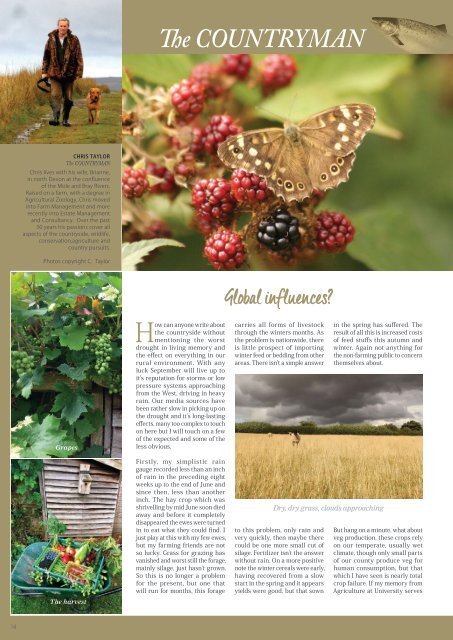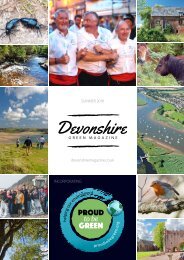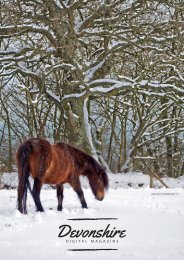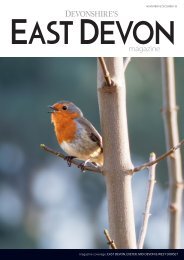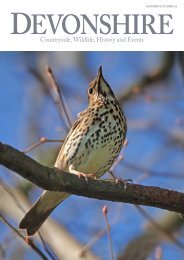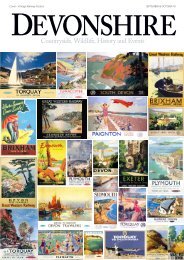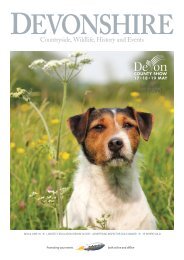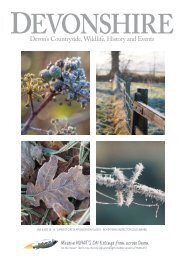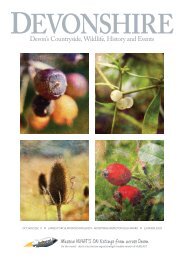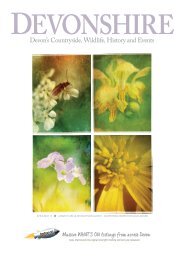Devonshire's East Devon magazine September October 2018
Create successful ePaper yourself
Turn your PDF publications into a flip-book with our unique Google optimized e-Paper software.
Th e C O U N T R Y M A N<br />
CHRIS TAYLOR<br />
The COUNTRYMAN<br />
Chris lives with his wife, Brianne,<br />
in north <strong>Devon</strong> at the confluence<br />
of the Mole and Bray Rivers.<br />
Raised on a farm, with a degree in<br />
Agricultural Zoology, Chris moved<br />
into Farm Management and more<br />
recently into Estate Management<br />
and Consultancy. Over the past<br />
50 years his passions cover all<br />
aspects of the countryside, wildlife,<br />
conservation,agriculture and<br />
country pursuits.<br />
Photos copyright C. Taylor<br />
A late Global start influences?<br />
to the season<br />
Cornflower<br />
Blackberry<br />
Grapes<br />
How can anyone write about<br />
the countryside without<br />
mentioning the worst<br />
drought in living memory and<br />
the effect on everything in our<br />
rural environment. With any<br />
luck <strong>September</strong> will live up to<br />
itʼs reputation for storms or low<br />
pressure systems approaching<br />
from the West, driving in heavy<br />
rain. Our media sources have<br />
been rather slow in picking up on<br />
the drought and itʼs long-lasting<br />
effects, many too complex to touch<br />
on here but I will touch on a few<br />
of the expected and some of the<br />
less obvious.<br />
carries all forms of livestock<br />
through the winters months. As<br />
the problem is nationwide, there<br />
is little prospect of importing<br />
winter feed or bedding from other<br />
areas. There isnʼt a simple answer<br />
in the spring has suffered. The<br />
result of all this is increased costs<br />
of feed stuffs this autumn and<br />
winter. Again not anything for<br />
the non-farming public to concern<br />
themselves about.<br />
Chicory<br />
Ragged The harvest Robin<br />
Firstly, my simplistic rain<br />
gauge recorded less than an inch<br />
of rain in the preceding eight<br />
weeks up to the end of June and<br />
since then, less than another<br />
inch. The hay crop which was<br />
shrivelling by mid June soon died<br />
away and before it completely<br />
disappeared the ewes were turned<br />
in to eat what they could find. I<br />
just play at this with my few ewes,<br />
but my farming friends are not<br />
so lucky. Grass for grazing has<br />
vanished and worst still the forage,<br />
mainly silage, just hasnʼt grown.<br />
So this is no longer a problem<br />
for the present, but one that<br />
will run for months, this forage<br />
Dry, dry grass, clouds approaching<br />
to this problem, only rain and<br />
very quickly, then maybe there<br />
could be one more small cut of<br />
silage. Fertilizer isnʼt the answer<br />
without rain. On a more positive<br />
note the winter cereals were early,<br />
having recovered from a slow<br />
start in the spring and it appears<br />
yields were good, but that sown<br />
But hang on a minute, what about<br />
veg production, these crops rely<br />
on our temperate, usually wet<br />
climate, though only small parts<br />
of our county produce veg for<br />
human consumption, but that<br />
which I have seen is nearly total<br />
crop failure. If my memory from<br />
Agriculture at University serves<br />
14<br />
14


